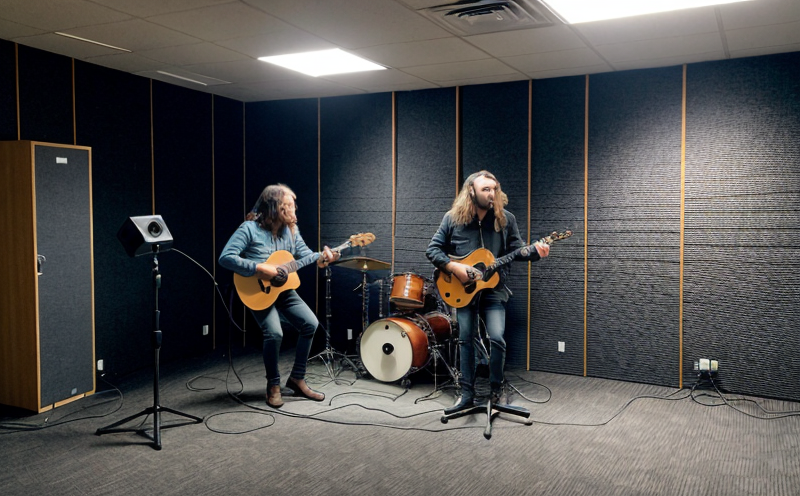EN ISO 11690-2 Guidelines for Noise Control in HVAC
The European Standard EN ISO 11690-2 provides comprehensive guidelines for the measurement and control of noise generated by HVAC (Heating, Ventilation, and Air Conditioning) equipment. This standard is crucial for ensuring that HVAC systems meet stringent acoustic performance requirements set forth by environmental regulations.
Accurate noise testing is essential to prevent excessive sound pollution in residential and commercial settings. The standard outlines the procedures for measuring the airborne noise emitted by various types of HVAC units, including fans, blowers, compressors, and condensers. By adhering to these guidelines, manufacturers can ensure their equipment operates within acceptable noise levels as defined by international standards.
The testing process involves several key steps: specifying the test setup, preparing the specimen (HVAC unit), conducting the measurements, and interpreting results against specified acceptance criteria. The EN ISO 11690-2 standard provides detailed instructions on how to perform these tasks accurately and consistently across different environments and conditions.
One of the primary advantages of using this standard is its focus on real-world operating conditions, which ensures that the noise measurements reflect actual performance rather than idealized scenarios. This approach helps manufacturers identify potential issues early in the design phase or during production, allowing for timely corrections before products reach market.
The standard also emphasizes the importance of considering both indoor and outdoor environments when conducting acoustic tests on HVAC equipment. Indoor testing focuses primarily on sound levels within buildings, while outdoor testing aims to assess how much noise escapes from facilities into surrounding areas. Both types of measurements contribute valuable data towards achieving compliance with local or national noise regulations.
Another important aspect addressed by EN ISO 11690-2 is the use of appropriate instrumentation for accurate measurement. The standard recommends specific equipment such as sound level meters, octave band analyzers, and wind screens to ensure consistent results across multiple tests. Proper calibration of these instruments before each test run further enhances reliability.
For those involved in quality management or compliance oversight within HVAC companies, understanding the nuances of EN ISO 11690-2 can significantly enhance product development efforts by providing clear standards against which performance can be evaluated. Compliance officers will find it helpful for ensuring that their organization meets all relevant regulatory requirements related to noise control measures.
R&D engineers working on new HVAC designs may benefit greatly from incorporating EN ISO 11690-2 into their research processes. By following these guidelines, they can focus more effectively on improving overall system efficiency while simultaneously reducing unwanted sound emissions. This dual approach not only enhances user experience but also contributes positively to public health and well-being.
Finally, procurement professionals responsible for selecting suppliers or components could leverage EN ISO 11690-2 as part of their evaluation criteria when evaluating bids from potential partners. Ensuring that all parties involved in the supply chain adhere to these internationally recognized standards fosters better collaboration and ultimately leads to higher quality final products.
Frequently Asked Questions
Benefits
- Ensures compliance with international noise regulations
- Identifies potential issues early in the design or production process
- Improves overall system efficiency
- Reduces unwanted sound emissions, enhancing user experience and public health
- Fosters better collaboration within supply chains by ensuring all parties adhere to internationally recognized standards
Industry Applications
| Type of Facility | Noise Control Requirements |
|---|---|
| Residential buildings | Reduction in sound pollution for better living conditions |
| Commercial offices | Avoidance of disturbance during working hours |
| Schools and hospitals | Protection of students' learning environment and patients' rest |
| Industrial facilities | Maintenance of worker safety and comfort in noisy environments |
Customer Impact and Satisfaction
By adhering to EN ISO 11690-2, HVAC manufacturers can significantly enhance customer satisfaction by producing quieter, more efficient equipment. Consumers appreciate the peace of mind that comes with knowing their homes or workplaces are free from excessive noise, contributing positively to both personal comfort and overall quality of life.
Additionally, businesses benefit financially through increased sales due to satisfied customers recommending products to others. Moreover, compliance with international standards enhances brand reputation among environmentally conscious consumers who prioritize sustainability practices.





